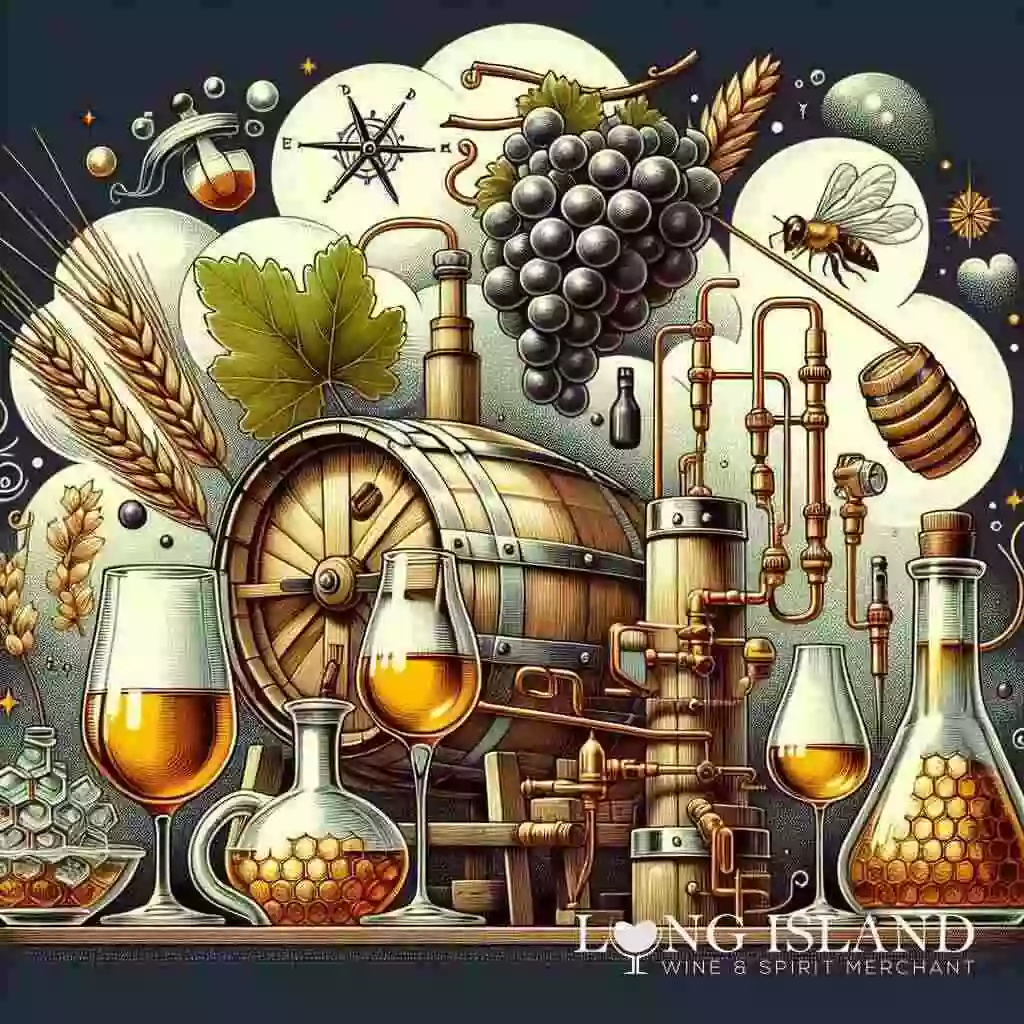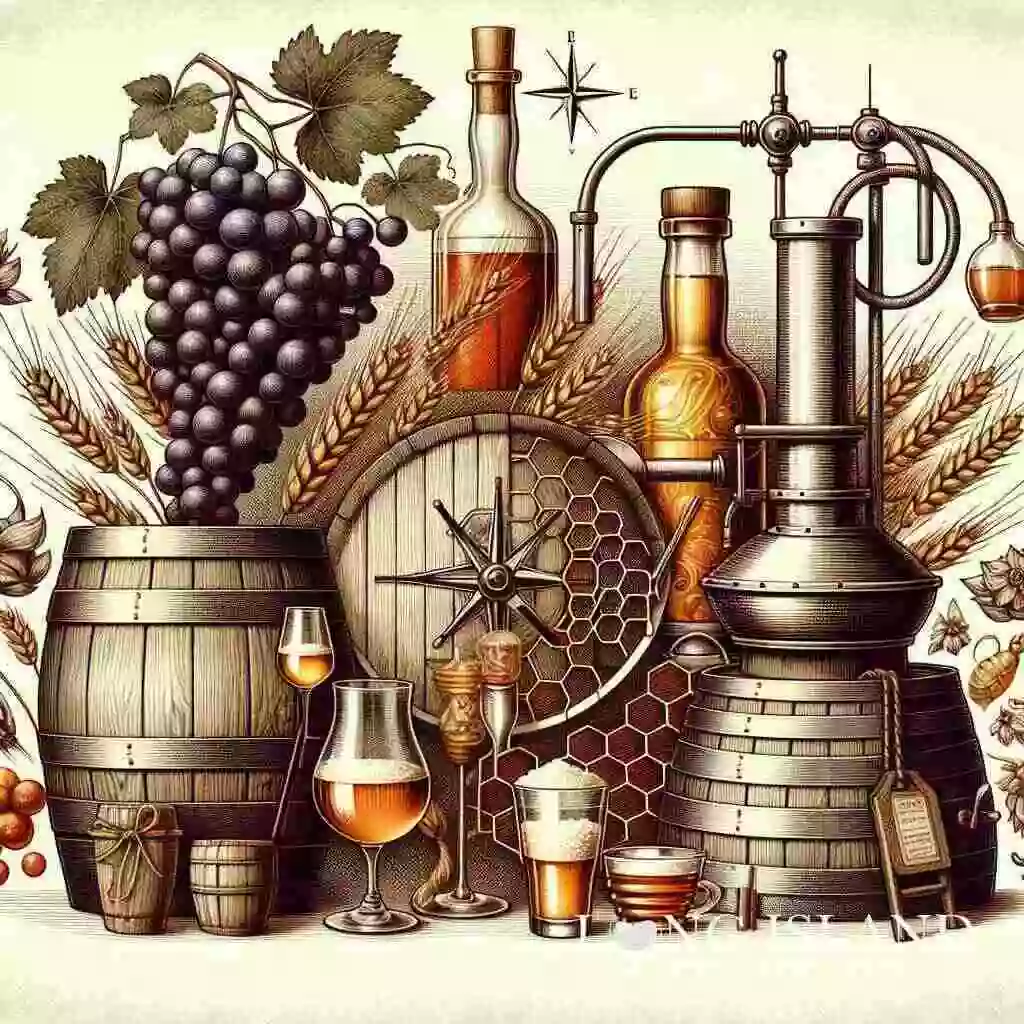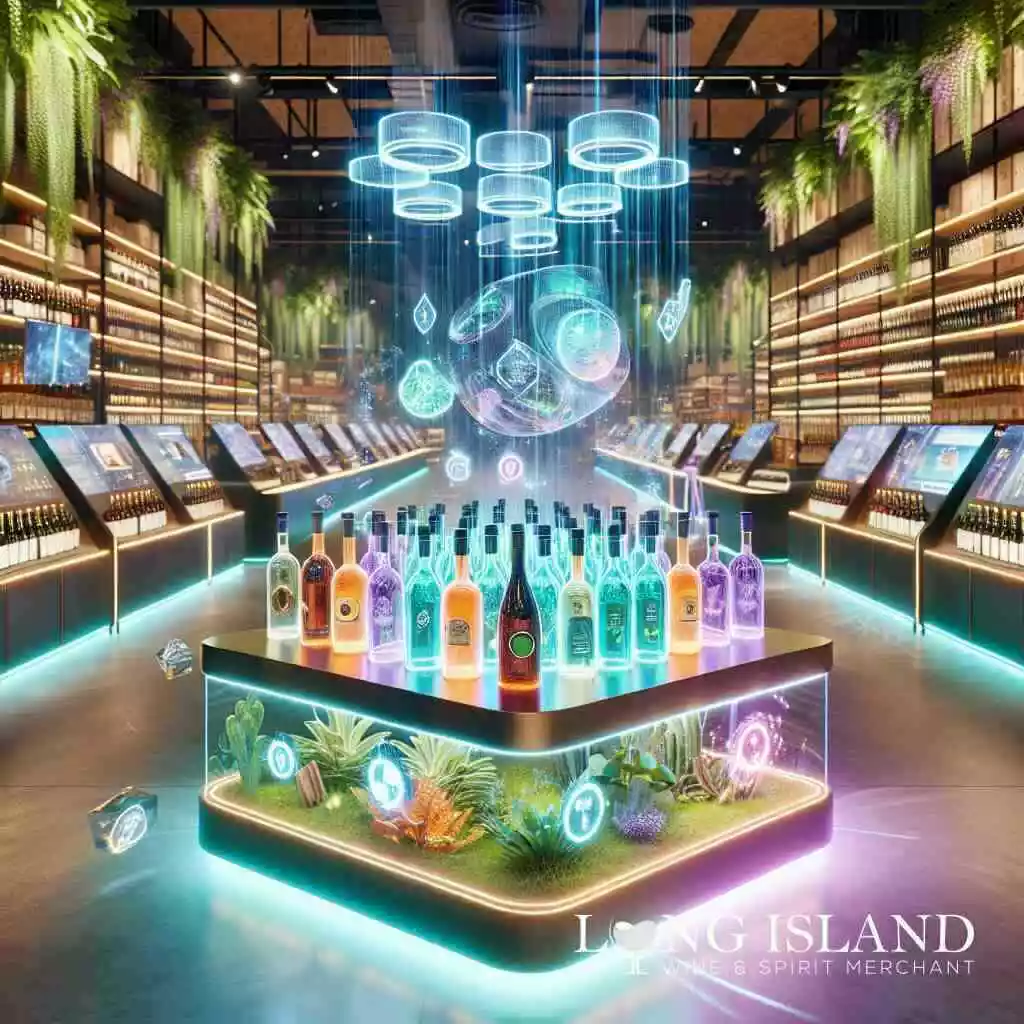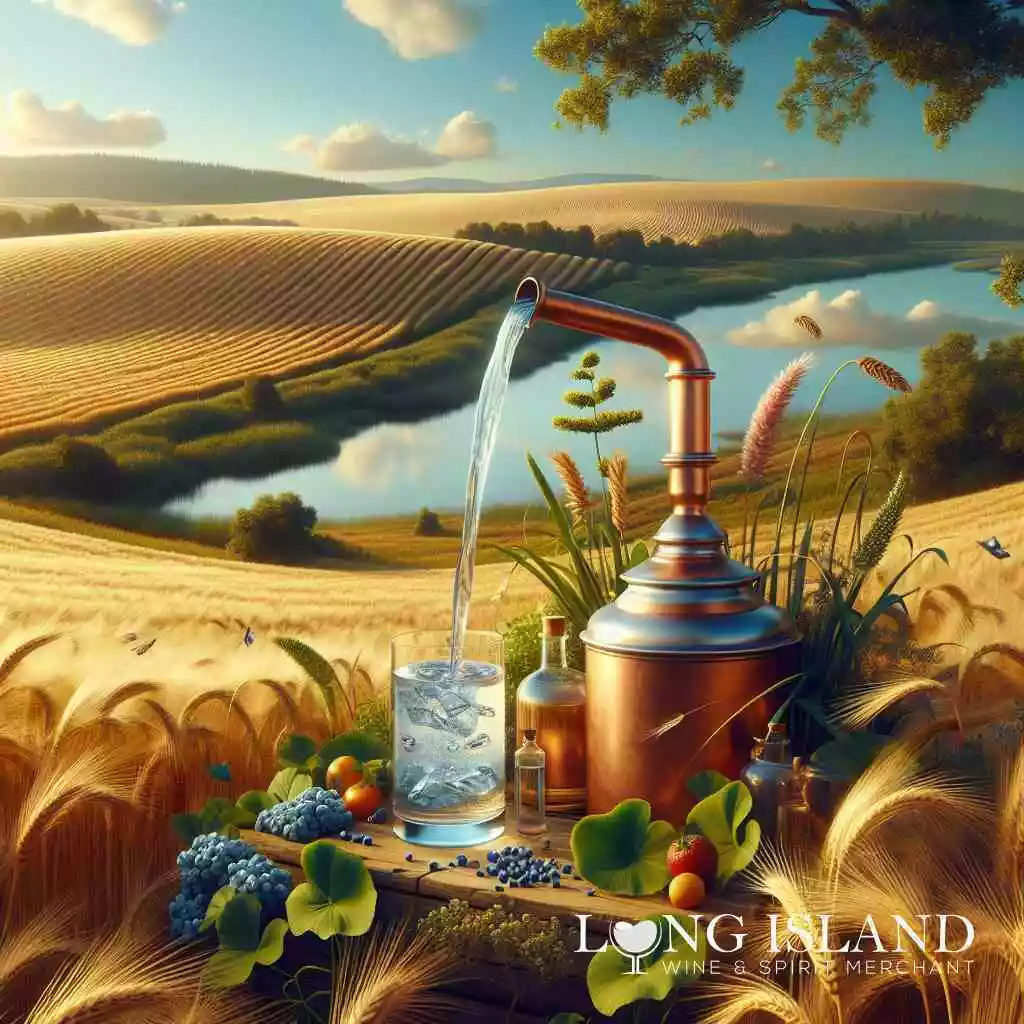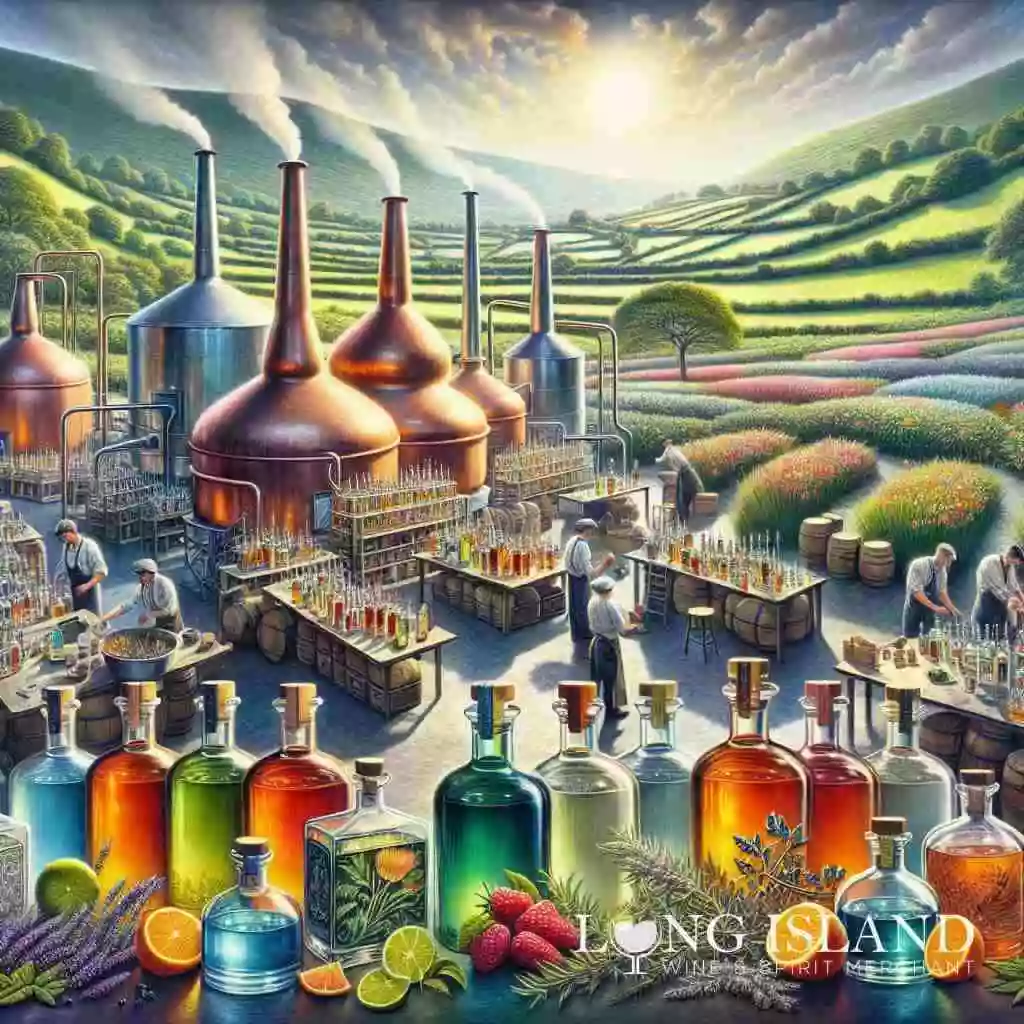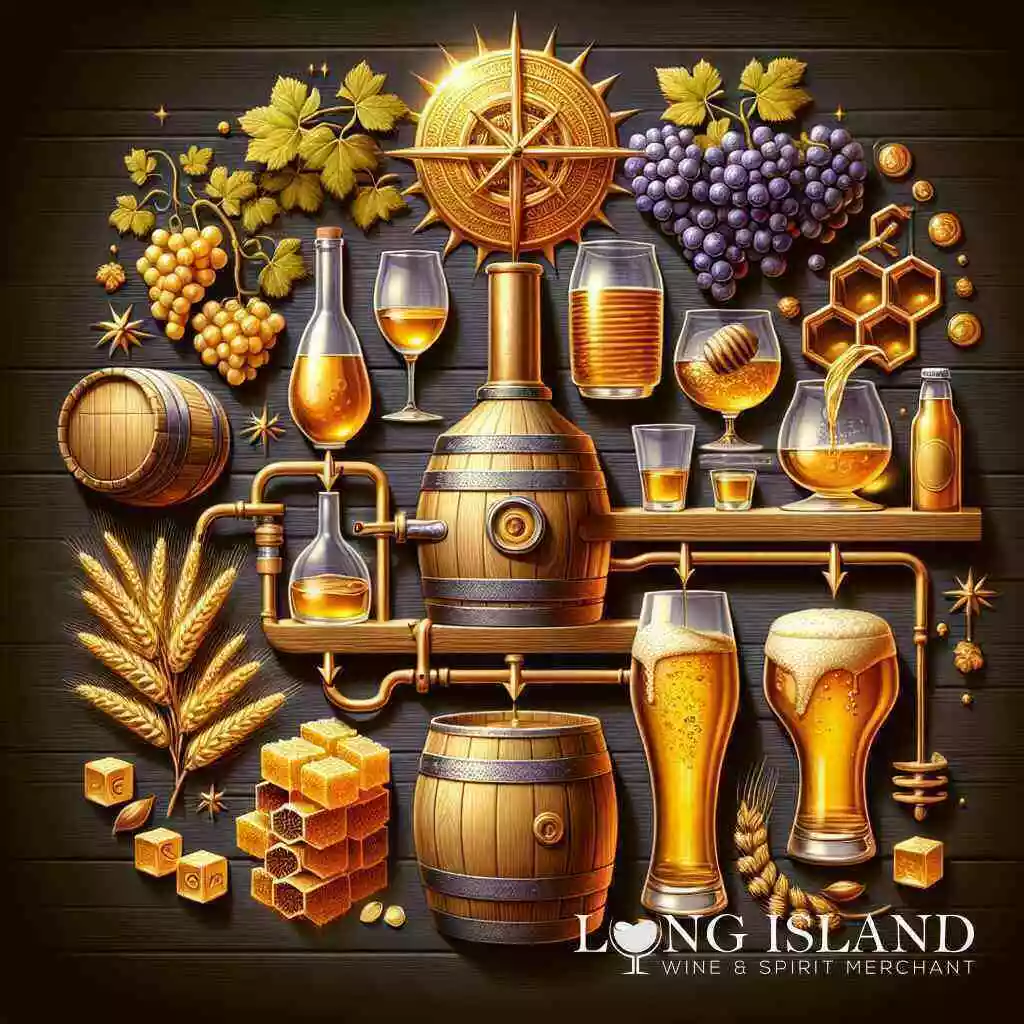
What Is Alcohol? Definition and Examples
May 16, 2024
Unveiling the Essence of Alcohol
Alcohol definition
Alcohol, in its most general scientific term, refers to any organic compound in which the hydroxyl functional group (-OH) is bound to a carbon atom. However, when people talk about alcohol in the context of beverages, they are usually referring to ethanol, or ethyl alcohol, the type of alcohol that is produced by the fermentation of sugars by yeasts or via petrochemical processes. Ethanol is the ingredient that gives wine, beer, and spirits their intoxicating qualities, distinguishing these drinks from other non-alcoholic beverages. The definition of alcohol lays the groundwork for understanding its role not just as a consumable liquid, but as a cultural and historical artifact that human societies have valued for millennia.
Ethanol: The Key Ingredient
At the heart of every alcoholic beverage is ethanol, a volatile, flammable, colorless liquid with a somewhat slight odor and a burning taste. It’s notably the principal type of alcohol found in alcoholic drinks, revered and consumed for its psychoactive effects on humans. Beyond its recreational use, ethanol’s properties make it useful in various industrial applications, medical settings as an antiseptic, and even in automotive fuels as a biofuel. Its universal presence across various sectors underlines its significance, but in the realm of beverages, ethanol in beverages dictates the experience, flavor, and strength of the drink, impacting everything from the body’s metabolism to the mood of the drinker.
A Brief History of Alcohol Consumption
The history of alcohol is as old as civilization itself, with evidence of alcoholic beverages dating back to ancient times. The oldest known alcoholic drink dates from about 7000 to 6600 B.C. in what is now China, where residue from a mixed drink of rice, honey, and fruit was found in pottery jars. Throughout history, alcohol has taken many forms, from the wines drank in ancient Greece and Rome to the spirits distilled during the Islamic Golden Age, setting the foundation for modern-day liquor. The role of alcohol has evolved over centuries, serving not just as a dietary staple and a source of nutrition in some cultures, but also playing a symbolic role in religious and ceremonial contexts. It’s a testament to humanity’s longstanding relationship with the fermentation and distillation processes that not only produce a vast array of alcoholic beverages but also cultivate social bonds, traditions, and cultural identities.
The Science Behind Alcohol
Fermentation Process
The fermentation process in winemaking is a natural phenomenon that has been harnessed by humans to produce alcohol for thousands of years. This process involves the conversion of sugars in fruits or grains into ethanol and carbon dioxide by the action of yeast under anaerobic conditions. It’s a delicate balance of science and art, where different variables such as temperature, sugar content, and types of yeast can significantly affect the flavor, aroma, and alcohol content of the final product. In winemaking, this process begins with the harvest of ripe grapes, crushing them to release their juice, and then adding yeast, which consumes the sugars present in the grape juice to produce ethanol and carbon dioxide. The magic of fermentation transforms a simple grape juice into a complex wine, imbued with a spectrum of flavors and aromas that differ greatly from its original form.
Distillation: Creating Spirits
Distillation is a method used to produce spirits, elevating the alcohol content by separating ethanol from the base liquid through heating and cooling. This process, detailed in information on distilled spirits, fundamentally changes the character of the original fermented liquid, concentrating its flavors and increasing its potency. Distillation begins with the fermentation of a liquid source, which can be anything from grain mash for whiskey to molasses for rum. The fermented liquid is then heated in a still. As ethanol boils at a lower temperature than water, it vaporizes first, ascending through the still, where it is then cooled and condenses back into liquid form, vastly more concentrated in alcohol than before. The skill of the distiller is paramount in determining the quality and characteristics of the final spirit, with decisions on the number of distillations, type of still, and the cut points, significantly affecting the taste and purity of the spirit.
Alcohol Chemistry and ABV (Alcohol By Volume)
Understanding the chemistry of alcohol and the concept of Alcohol By Volume (ABV) is crucial in the comprehension of alcoholic beverages’ strength and effects. At the molecular level, alcohol refers to any organic compound in which a hydroxyl group is bound to a saturated carbon atom. Ethanol (C2H5OH), the type of alcohol found in alcoholic beverages, is a small molecule that has profound effects on the human body, acting as a central nervous system depressant. ABV is a standard measure used worldwide to quantify the amount of alcohol (ethanol) contained in an alcoholic beverage. The ABV percentage indicates what portion of the total volume of liquid is alcohol. For example, a beer with 5% ABV means that 5% of the liquid is ethanol. This measurement helps to categorize drinks into various strengths, from the light beers to the potent spirits, allowing consumers to make informed decisions about their alcohol consumption.
Exploring the World of Alcoholic Beverages
Types of Alcohol
Alcoholic beverages encompass a vast and varied universe, each with its unique properties, production methods, and cultural significance. At the core, these beverages can be broadly categorized into three main types: beer, wine, and spirits. Each category, while defined by its alcohol content and method of production, houses an incredible diversity tailored to suit any palate or occasion. Beer, one of the oldest and most widely consumed alcoholic drinks, is primarily made from water, grain (like barley), hops, and yeast. Wine, with its rich tapestry of flavors, is primarily produced from fermented grapes or other fruits. Spirits, distilled beverages, concentrate alcohol by removing water from the base product, leading to a higher alcohol content. This spectrum of alcoholic beverages not only reflects the technological advancements and creativity of human civilizations but also their cultural preferences and agricultural practices.
For those looking to explore the types of wine, there’s a remarkable variety ranging from robust reds to refreshing whites, each with its notes, aromas, and complexities. Understanding the types of alcohol available can enhance one’s appreciation for what is being consumed, whether it’s a casual drink with friends or a fine wine savored for its craftsmanship.
Wine, Beer, and Spirits: What Sets Them Apart
The distinction between wine, beer, and spirits is not just about their alcohol content but also their history, production, and the way they’re enjoyed. Wine’s heritage is as old as civilization itself, often associated with sophistication and terroir, reflecting the region’s climate, soil, and tradition where its grapes were grown. Beer’s appeal lies in its diversity and accessibility, an everyday beverage that ranges from simple lagers to complex craft ales. Spirits, with their higher alcohol content, can be sipped slowly to appreciate their depth and complexity or mixed into cocktails for a broader palette of flavors.
Each type of beverage undergoes a different production process. Wine is made through fermenting grapes, beer from brewing cereal grains, and spirits undergo distillation, which concentrates the alcohol. These processes not only set these beverages apart but also contribute to their unique characteristics and flavors.
Hard Liquor and Its Various Forms
Hard liquor, or spirits, represents the most diverse and concentrated form of alcoholic beverages. This category includes a wide array of drinks such as gin, rum, vodka, whiskey, and tequila, each with its unique base ingredient and distillation process. These spirits can vary significantly in flavor, aroma, and strength, primarily influenced by their ingredients, the distillation method, and the aging process, if applicable.
Vodka, distilled from fermented grains or potatoes, is known for its clarity and high alcohol content. Whiskey, made from fermented grain mash and aged in wooden casks, offers a spectrum of flavors influenced by factors like the type of grain, the distillation method, and the aging process. Rum, derived from sugarcane or molasses, ranges from light to dark, each variant embodying different taste profiles and aging times. Gin is distinct for its botanicals, with juniper as a predominant flavor.
For enthusiasts interested in deepening their knowledge or starting a home bar, exploring the top whiskeys for a home bar in 2024 can provide a solid foundation. This diversity in spirits not only caters to a wide range of tastes and preferences but also enriches the cultural fabric of alcohol consumption, offering endless possibilities for exploration and enjoyment.
From Vineyard to Brewery: The Production Journey
Winemaking and Brewing Basics
The journey of alcohol from raw ingredients to our tables begins with intricate production processes, each tailored to the type of beverage being crafted. Winemaking starts with the harvest of grapes, which are then crushed and allowed to ferment. The fermentation process, where yeast converts the grape sugars into alcohol, is a critical step that determines the character of the wine. Different grape varieties, yeast strains, and fermentation conditions all contribute to the wide array of wine styles available today. For more insights on exploring various wine tastes, enthusiasts can delve into wine taste exploration to discover flavors that best suit their palate.
Brewing beer, on the other hand, is an art that combines water, malted grains, hops, and yeast. The process begins with malting, where grains are soaked in water, germinated, and then dried. This malt is then mashed with water, converting starches into sugars. The sweet liquid, or ‘wort,’ is then boiled with hops to add bitterness and flavor, before being cooled and fermented by yeast. This step-by-step transformation from simple grains to complex beers showcases the creativity and scientific knowledge inherent in brewing.
The Art of Distilling Spirits
Distillation takes the production of alcoholic beverages to a higher level of complexity and strength. Starting with a fermented base, such as beer or wine, the liquid is heated in a still. Since alcohol has a lower boiling point than water, it vaporizes first, rising through the still where it’s collected and condensed back into liquid form. This process may be repeated multiple times, resulting in spirits of higher purity and alcohol content. Spirits undergo further transformations depending on their type, including aging in barrels, the addition of flavors, or blending. For enthusiasts looking to dive deep into the world of spirits, exploring options for buying spirits and liquors globally can offer a treasure trove of distinct flavors and traditions.
Alcohol Industry Overview
The alcohol industry is a complex global network that encompasses the production, distribution, regulation, and sale of alcoholic beverages. It’s an industry that has seen continual growth, innovation, and diversification, driven by changing consumer tastes and advancements in production technology. Craft breweries, artisanal distilleries, and small wineries have burgeoned, offering an expansive variety of choices to consumers seeking unique and high-quality alcoholic beverages. The industry not only contributes significantly to economies worldwide through commerce and employment but also plays a vital cultural and social role. For a broader understanding of the alcohol industry and its offerings, particularly for those in New York, a comprehensive wine delivery guide in New York can provide valuable insights into navigating this vibrant market.
Alcohol Regulation and Culture
Alcohol Regulation Across the Globe
The regulatory landscape regarding alcohol varies significantly from one country to another, shaped by historical, cultural, and religious influences. In some regions, alcohol regulation is strict, with laws governing the production, sale, and consumption of alcoholic beverages, while in others, the regulations may be more lenient. For instance, in the United States, the legal drinking age is 21, which is higher than in many European countries where it is typically 18. Moreover, specific states and localities within countries can have their nuances, such as “dry” counties in the U.S. where the sale of alcohol is prohibited. These regulatory frameworks are put in place not only to maintain public health and safety but also to manage the economic aspects of the alcohol industry, from taxation to licensing. The vast diversity in alcohol regulation globally reflects the complexity of balancing individual freedom, cultural norms, and the societal impact of alcohol consumption.
The Role of Alcohol in Various Cultures
Alcohol holds a diverse array of roles in various cultures around the world, serving as a symbol of celebration, a sacrament in religious ceremonies, and a component of social gatherings and rituals. For many societies, specific alcoholic beverages are deeply ingrained in their cultural identity. For example, sake in Japan, wine in France and Italy, and vodka in Russia. Each culture has developed distinct traditions and customs surrounding alcohol consumption, from the toasting rituals of Scandinavia to the communal drinking practices of South Korea. Furthermore, alcohol’s role in cultures transcends mere consumption – it can signify hospitality, social status, and the rhythms of daily life. Understanding these cultural nuances offers deeper insights into the values and traditions of different societies, illustrating how alcohol can bridge communal bonds and mark the passage of time and seasons.
Alcohol Consumption Trends
In recent years, global alcohol consumption trends have exhibited interesting shifts. With growing health consciousness, there’s been an increase in demand for low-alcohol or non-alcoholic alternatives, with industries responding through innovation in products like non-alcoholic craft beers and distilled spirits. Despite this, traditional alcoholic beverages continue to enjoy popularity, with wine and craft beer seeing a resurgence in many markets. Moreover, the digital transformation has made ordering alcohol online more accessible, impacting how people shop for and consume alcohol. The rise of food and drink pairing culture, especially among millennials, has also influenced consumption habits, with a focus on quality and authenticity over quantity. Additionally, the globalization of alcohol brands and the advent of craft spirits highlight a consumer preference for unique, locally sourced products. These trends not only reflect changing consumer preferences but also signal a broader evolution in the global food and beverage landscape, where tradition meets innovation.
Navigating the Alcohol Market by Order Alcohol Online
Order Wine Online: A Click Away
The digital era has transformed the way we shop, and the convenience of ordering wine online has become a pivotal aspect of modern lifestyles. Order Alcohol Online, a premier service based in Commack, New York on Long Island, offers an extensive collection that includes red wine, white wine, rosé wine, sparkling wine, dessert wine, and fortified wine among others. With a comprehensive online platform, customers have the luxury of exploring and purchasing premium wines from the comfort of their homes. This service not only caters to various preferences and occasions but also provides detailed descriptions and recommendations, making wine selection an enjoyable and effortless experience. Furthermore, Order Alcohol Online ships across all 50 states, ensuring that your favorite wines are just a click away, regardless of your location.
Exploring Spirits and Liquors from Around the World
For those with a penchant for spirits and liquors, Order Alcohol Online presents a global tapestry of options. From the smooth and sophisticated notes of whiskey, brandy, and cognac to the versatile flavors of gin, rum, vodka, and tequila, this Long Island Alcohol Store offers a wide range of spirits that cater to every palate. Whether you’re stocking your home bar or searching for the perfect bottle to gift, the platform simplifies the global exploration of craft and premium spirits. Delve into the craft spirits online guide for 2024 to discover artisanal selections that promise to elevate your spirits collection. The ease of access and breadth of choices offer an incomparable journey through the rich histories and nuanced flavors distilled into each bottle.
Custom Alcohol Cases and Engraving Services
Order Alcohol Online goes beyond providing an impressive assortment of wines and spirits by offering unique services that add a personal touch to your purchases. With custom alcohol engraving services, customers have the opportunity to personalize their bottle selections, making them exceptional gifts for special occasions or corporate events. The process is seamless, adding a layer of thoughtfulness and distinction to your choice of alcohol. Additionally, the option to order custom cases of alcohol allows connoisseurs and casual drinkers alike to curate a selection tailored to their tastes or needs. Whether it’s a diverse range of wines for a wedding, a selection of craft spirits for a tasting party, or simply your personal favorites, these custom services enhance the overall experience of buying alcohol online. Indulge in the convenience and personalization that Order Alcohol Online provides, making every occasion memorable with a touch of exclusivity and elegance.
Safe Drinking: Enjoy Responsibly
Understanding Proof Alcohol Content
When it comes to alcohol consumption, understanding the concept of proof is crucial for responsible drinking. The proof of an alcoholic beverage is essentially twice the Alcohol By Volume (ABV) percentage. For instance, if a whiskey is labeled as 50% ABV, its proof would be 100. This measurement originated from historical methods of assessing alcohol content, providing consumers with a clear idea of the strength of their chosen drinks. Recognizing the proof can help individuals make informed decisions about how much alcohol they consume, taking into account the varying strengths of different beverages. This awareness is vital in ensuring that enjoyment does not turn into overindulgence, maintaining a balance between pleasure and health.
Guidelines for Safe Drinking
To promote well-being and minimize the risks associated with alcohol consumption, various health organizations have established guidelines for safe drinking. These recommendations typically define limits based on standard drinks, emphasizing the importance of moderation. For instance, it is generally advised that men limit their intake to two standard drinks per day, while women should aim for one. A standard drink is defined as any drink containing 0.6 ounces of pure ethanol. Adhering to these guidelines can significantly reduce health risks and ensure that alcohol remains a pleasurable part of social and cultural activities, rather than a source of harm. Understanding one’s limits, the effects of alcohol on the body, and practicing moderation are essential for responsible alcohol consumption.
The Impact of Alcohol on Health and Society
The impact of alcohol on health and society is a complex and multifaceted issue. On the one hand, moderate alcohol consumption can be a part of social rituals and celebrations, contributing to cultural identity and social cohesion. However, excessive drinking poses significant risks, including various health problems, such as liver disease, cardiovascular issues, and addiction. Socially, excessive alcohol consumption can lead to a range of negative outcomes, from strained relationships to economic productivity losses and increased healthcare costs. Recognizing these potential impacts is essential in fostering a balanced and informed perspective on alcohol. Encouraging education around the effects of alcohol, promoting safe drinking practices, and supporting individuals in making informed choices about their consumption can help mitigate these risks, ensuring that alcohol can be enjoyed responsibly and safely within society.
Conclusion: Alcohol’s Place in Our World
Reflecting on Alcohol’s Historical Uses
Alcohol’s journey through human history is a complex tapestry woven with cultural, religious, and social threads. From its earliest discovery, alcohol has served multifaceted roles, acting not just as a dietary staple but also as a medicinal remedy, a cornerstone of social rituals, and a valuable trade commodity. Reflecting on alcohol’s historical uses reveals its profound impact on civilizations across the globe. It has been a source of inspiration for artists, a subject of philosophical discourse among thinkers, and a communal bond that has united communities through shared traditions. This deep historical significance underscores the rich cultural heritage associated with alcoholic beverages, from the ancient brews of Mesopotamia to the sophisticated winemaking practices of the modern era.
Alcohol’s Role Today
Today, alcohol continues to play a dynamic role in society, embodying both tradition and modernity. It’s a symbol of celebration and camaraderie, often featured at weddings, anniversaries, and other milestone events. Alcohol also remains at the heart of many cultural practices, reflecting the unique identities and traditions of societies around the world. However, its role extends beyond mere consumption. The alcohol industry is a significant contributor to the global economy, providing jobs, fostering tourism, and generating billions in revenue. The craft movement, in particular, has spurred innovation, leading to a renaissance in artisanal wines, beers, and spirits that cater to a growing demand for quality and authenticity. Through platforms like Order Alcohol Online, consumers can explore an extensive selection of beverages, signaling a shift towards more informed and discerning consumption patterns.
Looking Towards the Future of Alcohol Consumption
As we look towards the future, the landscape of alcohol consumption is poised for further evolution. Emerging trends, such as the rising popularity of non-alcoholic and low-alcohol alternatives, reflect a growing emphasis on health and wellness. Sustainability and ethical production are becoming increasingly important to consumers, influencing the practices of wineries, breweries, and distilleries worldwide. The digitalization of commerce has also transformed how people select and purchase alcoholic beverages, with services like Order Alcohol Online simplifying access to diverse options. Furthermore, the future may see innovative technologies shaping the production, customization, and experience of alcohol consumption, from virtual tastings to augmented reality labels. Amid these changes, one constant remains: the enduring allure of alcohol as a vessel for social connection, cultural expression, and personal enjoyment. As we navigate this future, it’s crucial to continue advocating for responsible drinking practices, ensuring that alcohol retains its place as a cherished part of life’s celebrations and everyday moments.
Frequently Asked Questions
Question: What types of alcohol can I order online from Order Alcohol Online about what’s discussed in the “What Is Alcohol? Definition and Examples” blog post?
Answer: At Order Alcohol Online, we offer a wide range of alcoholic beverages, encompassing all the major types of alcohol discussed in the “What Is Alcohol? Definition and Examples” blog post. Our collection includes ethanol-based beverages such as red wine, white wine, rosé wine, sparkling wine, dessert wine, and fortified wine, along with beer and a variety of spirits like gin, rum, vodka, whiskey, brandy, tequila, and cognac. We pride ourselves on providing an extensive selection to suit any occasion or palate. From the fermentation process that creates the diverse world of wines and beers to the distillation techniques crafting fine spirits, our offerings reflect the rich cultural and historical significance of alcohol. Whether you’re exploring the art of winemaking, the tradition of brewing, or the craft of distilled spirits, we’re your go-to source for ordering alcohol online, delivering directly to your door in all 50 states.
Question: How does Order Alcohol Online ensure the quality of its alcoholic beverages, especially for those interested in the distillation and fermentation process?
Answer: Order Alcohol Online is deeply committed to quality. For products that involve intricate processes like distillation and fermentation, we partner with reputable wineries, breweries, and distilleries that adhere to the highest standards of production. Each product, be it a spirit, wine, or beer, is selected based on its quality, taste, and the craftsmanship behind it. By emphasizing the importance of the distillation and fermentation processes, as highlighted in our educational resources, we ensure that our catalog reflects the craftsmanship necessary to produce the depth of flavors our customers expect. Our commitment extends beyond the selection process, we also provide detailed descriptions and recommendations, assisting our customers in making informed selections that match their taste preferences and the occasions at hand. Trusting Order Alcohol Online means accessing a curated collection of the finest alcoholic beverages, with assurance in the authenticity and quality of your selections.
Question: In the context of alcohol culture and regulation, how does Order Alcohol Online comply with state and local laws across different service areas?
Answer: Complying with alcohol culture and regulation is paramount at Order Alcohol Online. We actively ensure that all our operations, including the sale and delivery of alcoholic beverages, strictly adhere to the legal statutes governing each of the 50 states we service. This commitment means conducting age verification checks to enforce the legal drinking age laws and respecting local regulations that may restrict the sale or delivery of certain types of alcohol in specific areas. Our website is designed to update in real time to reflect these regulations, providing a seamless shopping experience that respects state and local laws. Our dedication to compliance not only supports responsible drinking and the well-being of our customers but also reinforces our reputation as a trusted online liquor store. Whether ordering wine online or exploring spirits and liquors from around the world, customers can do so with confidence, knowing that Order Alcohol Online prioritizes legality and ethical business practices alongside quality and convenience.
Question: Can Order Alcohol Online assist in curating custom alcohol cases for specific events, and are engraving services available for all types of alcohol?
Answer: Absolutely, Order Alcohol Online excels at curating custom alcohol cases specifically tailored for various events, be it weddings, corporate gatherings, or intimate celebrations. Our team of experts is adept at selecting the perfect mix of wines, spirits, and beers to suit the occasion, taste preferences, and theme. Additionally, our unique alcohol bottle engraving service allows customers to personalize their selections, adding a special touch to gifts or event commemorations. This service is available for a wide range of alcoholic beverages including wine bottles, whiskey flasks, and more, making it ideal for creating memorable and distinguished presents. Whether you’re seeking to explore a spectrum of wine tastes or stock up on an assortment of distilled spirits for a tasting party, Order Alcohol Online provides both the breadth of choice and the personalized services to elevate any occasion.
Question: How does understanding the proof of alcohol content and ABV help in making safe drinking choices, and how does Order Alcohol Online promote responsible consumption?
Answer: Understanding proof of alcohol content and Alcohol By Volume (ABV) is crucial in making informed and safe drinking choices. Proof, which is twice the ABV percentage, offers a clear measure of how strong an alcoholic beverage is. Recognizing these numbers helps individuals gauge their alcohol intake more accurately, ensuring they can enjoy their beverages responsibly without overindulging. Order Alcohol Online promotes responsible consumption by providing detailed information on the ABV of all the products we sell. We also engage in educational initiatives that highlight the importance of moderation and understanding the effects of alcohol on the body. We aim to foster a community of informed consumers who not only appreciate the cultural and gastronomical aspects of alcohol but also prioritize their well-being and safety. Through transparent information, educational content, and promoting awareness about responsible consumption, Order Alcohol Online advocates for a balanced approach to enjoying alcoholic beverages.
